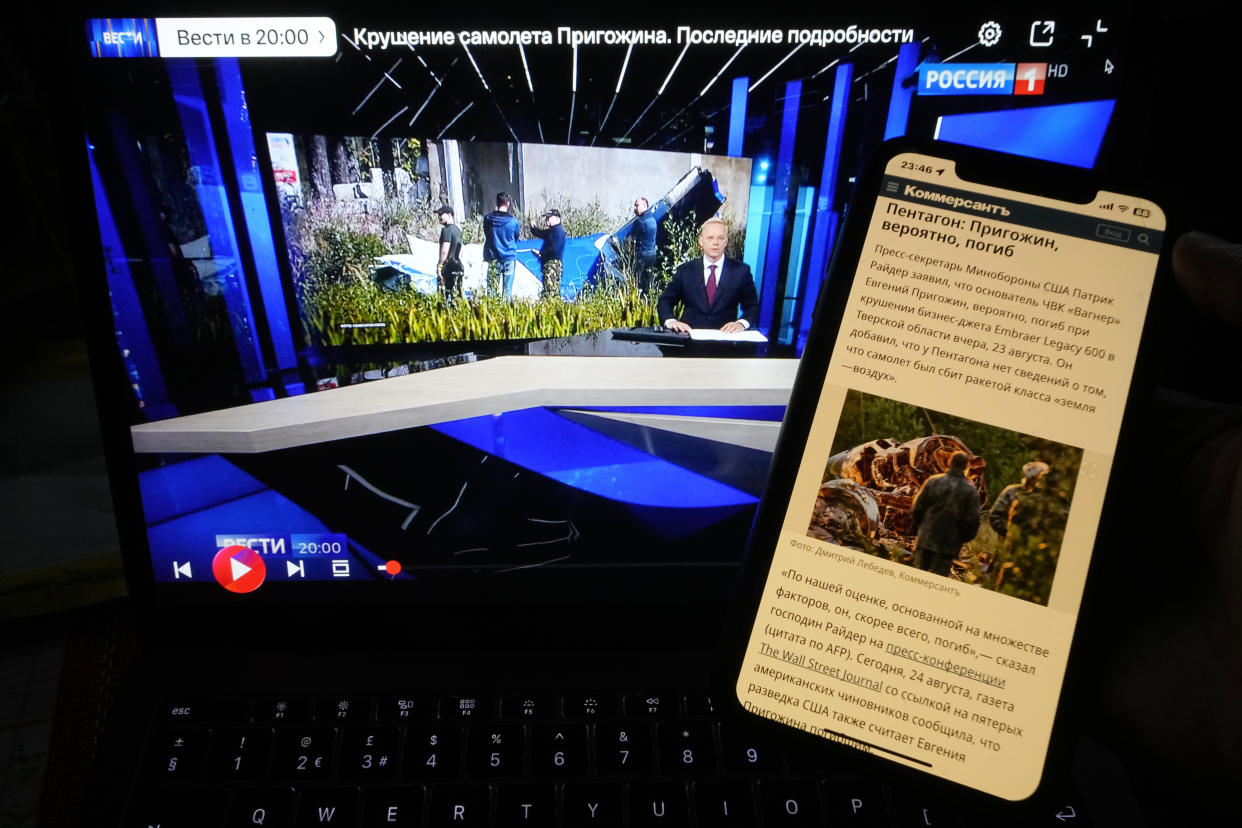While world media speculates on Wagner chief's presumed death, Russian state media shies away

LONDON (AP) — While news that Russia’s Wagner mercenary chief was believed dead in a plane crash dominated world reports Thursday, along with speculation that it was linked to his June mutiny, Russian state media painted a very different picture.
State TV channels Russia 24 and Russia 1 on Thursday largely stuck to describing the investigation into the previous day’s crash that killed 10 people. Wagner chief Yevgeny Prigozhin, whose brief march on Moscow was seen as the biggest challenge to Russian President Vladimir Putin's 23-year-rule, was mentioned only toward the end of some reports.
Meanwhile, state Russian channels focused on portraying Putin as calm and in control.
There was extensive coverage of Putin’s participation, via virtual link, at the summit of BRICS nations in South Africa. Russia 24 covered Putin's speech at the BRICS summit in its entirety without any usual ad breaks or customary news bulletins.
In contrast, independent Russian media outside the country, such as online news outlet Meduza, gave blow-by-blow coverage of the crash.
And many Russians feverishly discussed Prigozhin's presumed death online, including speculation prevalent in the West that Prigozhin's death might have been an assassination to avenge his role in the aborted June mutiny.
Sergei Mironov, the leader of the pro-Kremlin Fair Russia party and former chairman of the upper house of the Russian parliament, suggested on his Telegram channel that Prigozhin had been deliberately killed.
“Prigozhin messed with too many people in Russia, Ukraine and the West,” Mironov wrote. "It now seems that at some point his number of enemies reached a critical point.”
Although social media is increasing in popularity among Russians, most of the country still gets its news from a powerful state television network which encompasses multiple channels across 11 time zones. There are no independent television channels left in Russia since Putin cracked down on dissent in the aftermath of his invasion of Ukraine.
Analysts speculated that the muted coverage on state television indicated that networks had been given little official direction and were unsure as to how to respond.
“It’s not impossible that there could have been an instruction to keep it quiet,” said Keir Giles, a Russia expert with the international affairs think tank Chatham House in London. “But it is equally possible they were playing it safe in the absence of a lead and potentially in the absence of instructions from Kremlin power structures on how to spin this.”
The closest Russian television seemed to get to addressing the rumors and speculation was during the state Russian television talk show 60 minutes on Russia 1. Known for news items with dramatic music, the show did not cover the crash but rather Western media's response to it.
Olga Skabeeva, one of the most prominent Russian television presenters and propagandists, introduced a piece with clipped-up “breaking news” headlines from the US, UK and Australia which suggested the West was responding hysterically.
Another of Russia’s most famous television news anchors, Vladimir Solovyev, suggested Ukraine was behind the reported deaths of Prigozhin and some of his top associates.
But, by Thursday afternoon local time, news of the crash and Prigozhin's fate seemed to have dropped down to the bottom of news bulletins or off them entirely.
That was, until Putin spoke.
“I want to express my sincere condolences to the families of all the victims. It’s always a tragedy,” Putin said in remarks recorded at a meeting with the head of the Russia-annexed Donetsk region in Ukraine.
Recalling that he had known Prigozhin since the early 1990s, Putin described Prigozhin as “a man of difficult fate” who had “made serious mistakes in life," adding that, "he was a talented man, a talented businessman.”
In the hour after Putin broke his silence, his comments rocketed up to the top of some state news bulletins before dropping back down again, suggesting, analysts said, that Putin's words had not given state news networks enough of a steer for coverage.
Giles said said he expected Russian state media to give coverage of Prigozhin's fate “less prominence in Russia’s domestic news than you would expect, but not write it out of the script altogether."
By 9 p.m local time in Moscow, the story had dropped about half-way down the news updates on Russia’s flagship news program on the First Channel, behind reports about Putin meeting veterans of the war in Ukraine and the BRICS summit. The network briefly mentioned Prigozhin was on board the plane, reporting that an eyewitness saw it “do pirouettes” as it came crashing down to earth.
But there was no suggestion as to the cause of the crash, nor comment from Western leaders who indicated it might not have been an accident or even that it was ordered by the Russian leader himself.

 Yahoo News
Yahoo News 